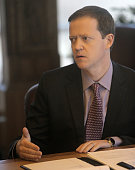Hey, Boston 2024. It's not US(OC). It's you. You have rightly earned the execution that common sense and political reality says you deserve on Monday.
It's this elemental. The International Olympic Committee is holding its annual get-together later this week, in Kuala Lumpur, Malaysia. At that meeting the IOC will select its 2022 Winter Games city, either Beijing or Almaty, Kazakhstan. The U.S. Olympic Committee simply cannot put itself in the position of going to a meeting at which the IOC is going to select an Olympic city without itself having a viable Olympic bid.
The USOC has given Boston 2024 time to prove itself. Too much time, to be blunt. But now time is up.
It's thus time to accept the inevitable and look ahead to what's next if the USOC has any hope for winning in 2024: Los Angeles.
In 1984, Los Angeles saved the Olympic movement. Now LA has to save the USOC.
And maybe win for 2024. Los Angeles is an Olympic city. It is America's Olympic city.
Recent events have pointed out the vivid contrast between Los Angeles and Boston.
Over the weekend, tens of thousands of fans went to the Los Angeles Memorial Coliseum for the opening ceremony of the Special Olympics World Games. The city of Los Angeles is spending $12 to $15 million in in-kind services in support of the World Games. A torch relay rolled through town before the ceremony.
Boston, meanwhile, has over the past six months proven to the world what most stereotypically consider its worst trait -- coming off as an insulated, angry group of navel-gazing NIMBYs who don't trust outsiders and don't think there is anything in the world that is better or can be improved about the place.
The Hub? Ha.
This Boston bid is so wretched that it has now emboldened Toronto -- which staged he Pan American Games this month -- to seriously consider a candidacy. Let's say Toronto ultimately jumps in. How is the USOC supposed to make the case for another city in the eastern time zone? Against a competitor that is hip, trendy and readily touts its status as the fourth-biggest city in North America? (Mexico City, New York, LA.)
On Friday, the Boston 2024 bid committee released the damning last details of Bid 1.0.
In December, the bid presented certain assertions to the USOC. In January, when Boston was selected, an amazing number of changes had been made. Later still, more changes.
Never even mind the trivial stuff, done for PR purposes, maybe, such as Patriots owner Robert Kraft originally said in December to be on board but mysteriously gone by January.
In the December file: a $471 million revenue gap in the committee's proposed operating budget. January: no mention of that gap or the fact that additional revenues would be needed.
$471 million? Not accounted for? What, it just vanished? No explanation?
December: opposition to the bid characterized as minimal. “Four local activists formed a group in opposition to our bid, and while we respect their differing views and their right to promote them, our polling data shows that they do not represent the majority of public opinion,” Boston 2024 wrote. “No elected official has publicly endorsed the group, they have not received significant financial backing and their efforts have been limited to social media.”
Reality: poll numbers have been -- from the start -- dismal, approvals now in the 30s or 40s. Opposition is a solid 50. The IOC won't go for those numbers. No way.
The televised debate last Thursday between USOC board member Dan Doctoroff and Boston 2024 bid leader Steve Pagliuca, on the one hand, and No Boston Olympics co-chair Chris Dempsey and Smith College economist Andrew Zimbalist, on the other -- it was always going to be a Hail Mary.
It ended up being most memorable for Zimbalist's observation that the bid committee's numbers reflected "drunken optimism." And of course the scene of Doctoroff, who is one of the smartest people anyone could ever meet, being portrayed -- predictably -- as the New York wise guy coming to tell the Boston people what they should do.
Back to December: no referendum. Now: referendum in November 2016.
This alone offers the USOC the easy way out. The IOC's Olympic Agenda 2020, president Thomas Bach's would-be reform plan, considers the time before September 15, when applicants must be formalized, an "invitation" phase -- when bids are explored in a less-formal sense than before.
The IOC could rightly insist that any such referendum be held before "applicants" become "candidates," which would enable the IOC to kill off Boston early on in its IOC process, causing the USOC -- and the Olympic movement in the United States -- damage for years to come.
All the USOC has to do is hang its hat on Agenda 2020 -- that is, say Boston was an exploratory matter and switch to LA.
The details released Friday don't give the USOC any choice, really.
It would appear that Boston lied, cheated or misrepresented to win in the domestic phase against LA, San Francisco and Washington.
So which is it -- lying, cheating or misrepresenting?
Whichever -- the USOC can't be in the position of aligning itself with an effort where that is a central question.
Note that the Boston people didn't defend what was released in Bid 1.0. Instead, they said the focus now is on 2.0, released in late June. So telling.
If you are the USOC, one, how do you live with that? You hold yourself out to be the standard for the highest sorts of ethical conduct. Yet you would allow people to misrepresent, cheat or lie to you? You accept that -- you look not only foolish but incompetent.
Two, USOC board chair Larry Probst and chief executive Scott Blackmun have spent five years doing good work in the international arena. Should they now go abroad now and expect to be asked, which is it -- lying, cheating or misrepresenting -- and why in the world would you be sticking with this effort?
And there's more.
-- Boston 2024 fundraising? Millions of dollars, yes, but in the low single digits when the number that would be needed is roughly $75 million. Boston 2024 says, in essence, trust us. Query: why? On what basis has Boston 2024 earned public or corporate trust?
-- Mayor Marty Walsh's dithering on the host city contract.
-- Governor Charlie Baker? He has more information at this stage of the bid process than any elected official in history. (Not an overstatement.) And, still, he purportedly can't make up his mind.
These make up the financial and political currents that, finally, would reasonably compel the USOC to action.
You can't run a winning Olympic bid without strong -- indeed, unwavering -- political support.
The USOC, according to an Associated Press report, pushed Baker for support last Friday. (Did the USOC deny the report? Hardly.)
He responded by saying he's still waiting for a consulting report, due out in August.
The governor is due to call in Monday to the USOC's teleconference on 2024. He is on record as saying he's going to tell the USOC board the very same thing he said Friday: he's waiting for that report.
You can understand why, with the poll numbers in the tank, the governor might want to keep his distance.
Compare to Los Angeles:
Poll numbers in the high 70s. The mayor, Eric Garcetti, eager to bring the Games to town. The city council -- 15 members -- unanimously in support. Same for the five-person county board of supervisors: unanimously in support. Backing as well from all around Southern California, including the mayors of towns such as Santa Monica and Pasadena, where events would be held. The governor -- Jerry Brown, everyone -- on board, too, with a signed letter of support to the USOC. The leaders of the state legislature -- they're in support, too.
Indeed, Los Angeles provided to the USOC the signatures of the governor and state senate and Assembly leadership, what in California political circles is called the "Big Five." That letter got done in one day. What does that show? Not only that LA is America's Olympic city. But it's where Olympic stuff gets done.
This is all public. This is all on the record.
Behind the scenes, meanwhile, the IOC has made it clear what should be done. It knows, too, that change is hard and that a switch out of Boston might yield one rough week of bad PR for the USOC. But then that will be that, and the IOC will have what it wants -- a credible American candidate.
That's why, too, the time is now for the switch to LA -- to recognize the inevitable, and move forward.
Time for a shot at winning a 2024 race that might yet be winnable.









